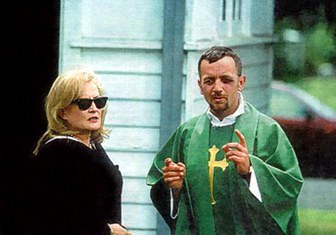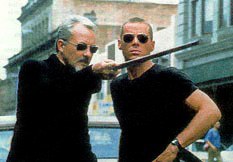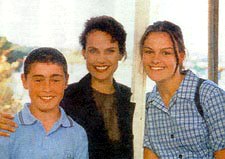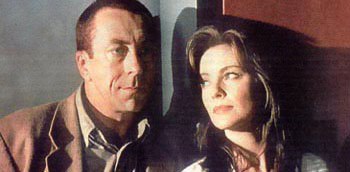No tall poppies, we're team spirits
When writing for Australian television drama there are quite rigid and narrow rules, to which you must conform if you want to reach an audience. Graham Thorburn explains

Kate Fitzpatrick and Steve Adams in Something in the Air
EVERYBODY knows everyone, We like it that way, sings Melinda Schneider in the opening titles of Something in the Air four nights a week on the ABC.
But do we? Is she singing about us, or the characters? And why do "we", who live in the most urbanised of Western nations, make so many shows set in small country towns?
The ratings have started again, and in any typical week during the ratings period the commercial networks and the ABC between them put to air about 60 hours of made-for-television action drama and comedy. Of these, between 10 and 12 hours are made in Australia by Australians. Almost certainly, if it wasn't for our local content rules, there would be even less. Nevertheless, some of these Australian shows have big audiences, and continue to be renewed season after season, so it seems fair to say that they connect with their audience in some way.
I should declare an interest here. At various times in my life I have made a considerable portion of my living directing TV drama. In fact, if you saw the "Maggie's Funeral" episode of Blue Heelers in recent weeks, you'll have seen some of my work. I want to see Australian drama on our TV screens. I want the opportunity to make it, and I want to feel it's part of a communal dialogue. I want it to engage us, to extend beyond the box in the corner of the room to be discussed around office water coolers throughout the country.
So what do the popular Australian shows say to us about us?
Watching British TV, it sometimes seems that the English spent a thousand years developing a class system so pure that, in the age of TV, their dramas and sitcoms could be built on it. As you'd expect, American TV reflects quite different concerns. At its heart, US drama is almost always about the individual's struggle to remain true to himself or herself, no matter what it costs in terms of relationships and flouting the pressures to conform.
So, what about us? What's at the core of Australian TV drama?
The quintessential Australian drama is about a group of people in happy equilibrium intruded upon from the outside, and either repelling the intruders, or modifying them so they can be absorbed into the group, and so restoring the equilibrium.
It has its own rigid and narrow rules, to which it either conforms or fails to reach an audience. It is about the group, not the individual. It's about defending and restoring what was, not pursuing what isn't. It's about making choices through loyalty and consensus, not belief and principles. And there is no moral ambiguity — if evil is present, it is either far away, or trivialised. It's never present in one of the central characters.

Marcus Graham in Good Guys, Bad Guys (on right)
Following a tradition that stretches from Bellbird, through A Country Practice right up to Something in the Air, SeaChange is probably the archetypal show of this kind.
It's the little community of fibro shacks in a corner of the Garden of Eden before the Fall. It might not have everything, but what it hasn't got isn't worth having, or comes at a cost not worth paying. No individual is to be given more importance than any other, even in storytelling terms. Evil inside the community is misguided and comically inept, easily dealt with. Real evil, if it exists at all, is over the horizon in the big city beyond the town across the bridge.
It looks back to a mythic past, and is peopled by decent lower-middle-class Anglo-Celtics. In SeaChange even the token ethnic is a middle-class Indian, more English than the English.
Of course, other cultures also make this kind of show. Pearl Bay is not a million miles from Northern Exposure's Cicely, or Ballykissangel or Lochdubh. But those countries make other kinds of dramas as well, and in any case there are crucial differences.
SeaChange is about how the community moulds and modifies Laura so she can be absorbed into its safe arms. Hamish Macbeth is about how Hamish reconciles impersonal (city) laws with being part of a small community. Lochdubh doesn't need a broken down bridge to keep the outside world at bay — Hamish isn't going to let the boys from Inverness come tramping around with their big-town ways of looking at things (though he's not averse to mixing it with the occasional girl from out of town).
It's his show. Like more than half the US shows, and nearly as many British shows, it's even named after him. How many Australian characters can claim that?
Women? Halifax fp. What about blokes? Rafferty's Rules. Okay, but that was almost 15 years ago. What about Marcus Graham in — what was it called — oh yeah, Good Guys, Bad Guys. Damn. Surely Gary Sweet must have done one — Police Rescue, Big Sky — ah — Cody! Anyone remember Cody?

Is this the tall poppy syndrome? Is it that either the audience or the industry feels uncomfortable with "stars"? Or is it that we, that mysterious symbiosis of storyteller and audience, are only comfortable seeing ourselves as part of a group, not as individuals?
Perhaps it's a gender thing — most of the audience for Australian drama is female, and our writing teams are often quite strongly female. Or perhaps it's just a logistical thing — the way we make the shows, driven by our tight-as-a-drum schedules and budgets.
Both Halifax fp and Good Guys, Bad Guys (which in any other country would have been called Elvis Maginnis — well, maybe not Elvis Maginnis — perhaps The Fixer or The Laundry Man or...) came from writer-producers Roger Simpson and Roger Le Mesurier.
Many American shows are driven by writer-producers, who write most of the episodes: David E. Kelley (Ally McBeal and The Practice — simultaneously!); Chris Carter (The X Files); Steve Bochco (NYPD Blue), to name a few. Britain has always supported single-writer drama — Dennis Potter, whose central characters always seemed an exaggerated version of himself; Jimmy McGovern who created Cracker for Robbie Coltrane.
But at the very most they make 26 episodes a year. Our norm of 42 hours a year for a drama series means we've had to develop a different system, one in which the producer delegates scripts to a script department, which develops the storylines, farms out the individual scripts to freelance writers, and then reworks them for consistency. Perhaps this kind of teamwork approach to writing favours team stories?
Or perhaps it's a deeper part of our culture. Perhaps it's not a coincidence that this is the land of the upward inflection — where every potential statement is turned into an "I might admit to thinking this if I find out you agree with me" question — where the new vocal tie is the taking-both-sides "Yes-No" before committing yourself to answer. As the TV industry joke goes — "How many directors does it take to change a light bulb?" "I don't know. What do you think?"

Sigrid Thornton with Kane McNay and Cassandra Magrath from SeaChange
I think it goes deeper than the titles. As I've said, all successful Australian shows are about the group intruded upon, not the individual in pursuit of something. In the terms of the Westerns that supplied so much early TV drama, our shows are about "defending the fort", not "hunting Indians". You can have a critical success doing otherwise, but you won't reach an audience. Farewell Wildside.
On the surface, Halifax fp and Cracker are very similar — they're both notionally about an individual tracking down and exposing criminals through understanding and analysing the criminal mind: "hunting Indians". But Halifax keeps turning this around, so that Jane becomes the victim, yet again trapped alone in a dark warehouse with the dangerous creep she's pursuing. There's nothing wrong with that as a dramatic device: Cracker gets himself in too deep at times as well.
But Robbie Coltrane's character is deeply flawed — in many ways he is like the people he pursues, whereas Jane is squeaky clean. Cracker's flaws get him into trouble, but they also give him the tools to get out of it. Cracker allows for evil, agrees that it needs to be dealt with, but also says that it has a place within each of us, and may even be the most interesting part of us. Australian shows will not allow a central character to be morally ambiguous, so Jane has to be squeaky clean — a contemporary version of God's Police. As a result, when she gets into trouble, she seems either stupid, a victim, or both.
Compare this to Homicide, Life on the Streets, where you can discover that a central character is a murderer, but you're asked to keep following his story, to see him do both good and bad, to confront the duality of humanity. Or Dennis Franz's character in NYPD Blue a seething volcano of racism, violence and recovering alcoholism. Detective Andy Sipowicz isn't just patrolling the streets, he is the streets.
Not all "hunting Indians" shows use such complex characterisations. Law & Order is probably the purest "hunting Indians" show on TV. It's entirely concerned with the capture and trial of the "perp". And like the cops in all Australian police shows, there is no dark side to the central characters — they are trustworthy, decent human beings doing a difficult job on our behalf.

But even our shows that would appear to be about pursuit are much more concerned with the survival of the group than the success of the chase. Law & Order can deal with a whole storyline about a central character's wife dying slowly of cancer with a single tiny scene: "How are things?" "Not so good." "You know that if there's anything..." "I will."
It's inconceivable that any of our police shows would deal with the personal trauma of a central character so laconically, so perfunctorily. Nor would they do a story about an obsessive controlling father without a single reference to the family of any of the team.
We always turn it back to the effect on the group. But because we don't want to deal with competing ideologies or unresolved tensions within the group, we couch this in terms of competing loyalties, often set up by the "I know him!" opening.
In one two-week period last season Water Rats and Stingers used this device three out of four times — the drowned victim who turns out to be the girlfriend of the best mate at school ("We were going to be in a band together, we were going to conquer the world"); the security guard a leading character accidentally shoots who was his best friend at police college, and married the girl he always fancied ("Whatever happened mate, how did it come to this?"); the nephew spotted scoring drugs in the middle of a sting ("Remember when we used to go fishing?").

Inside the Square: Steve Bisley and a 'squeaky
clean' Rebecca Gibney in Halifax fp
The pattern is always the same. They come across someone they know, but haven't seen for ages. They re-establish the relationship amid lots of "remember when" scenes. This puts them in conflict with the rest of the team. They eventually have to choose between these conflicting loyalties. But they can only choose the existing team, otherwise there is no show next week — which leads to the fake climax — lots of shouting and door-slamming to disguise the predictability of the outcome.
If a show is about individual pursuit, then it can fail occasionally (or every week in Ally McBeal's pursuit of the perfect marriage of career and romance) without jeopardising the show. But if it's about preserving the team, and the audience won't tolerate unresolved tension between the characters, then it must be resolved in the same way every week. Like Question Time in Parliament, the more predictable the outcome, the closer the positions of the parties, the louder the argument.
But so what? Even if this is us, what's wrong with it? We are shaped by our history and our geography — a harsh and unforgiving land halfway around the world from our sibling cultures — so what's wrong with facing the world with decency, commonsense and neighbourliness? With egalitarianism? With valuing and defending what's worthwhile, even if it means sacrificing personal values for group ones? With reaching decisions through consensus, not ideological struggle?
Well, nothing. Except that, every now and again, like Ronald Reagan in Kings Row, when he wakes up to find his legs amputated, I find myself asking, "But where's the rest of me?" Where are the passions that threaten and enliven? Where is the loneliness and exhilaration of facing our own demons? Where are the stories about uncertainty and confusion, the struggle to find meaning when we only think we know what lies in each others' hearts?
Or is this exactly what we're running away from?
I don't know. What do you think?